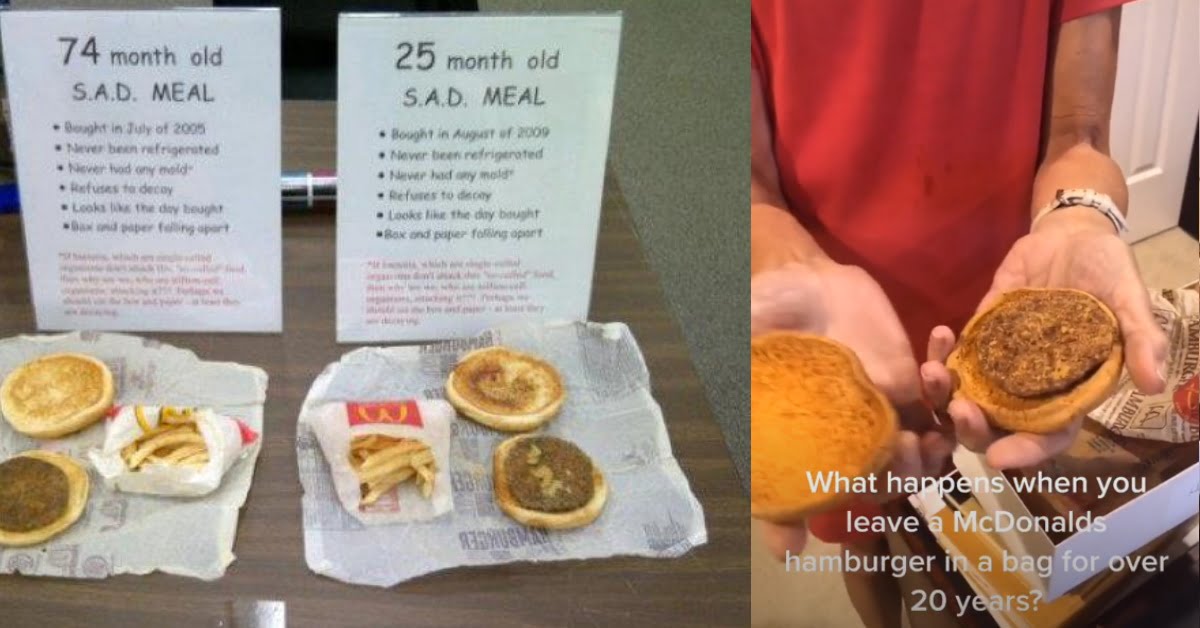According to information spread on the Internet, the products of the world's most popular fast food chain have such a non-standard composition that they practically do not spoil under normal conditions. We checked if this is true.
Here's what you can learn from the list "10 little-known facts about McDonald's": “Food from McDonald's does not spoil for years. This is a well established fact. In 1999, American David Whipple bought a hamburger at McDonald's, put it in his coat pocket and forgot about it. Imagine his surprise when, 14 years later, he took a hamburger out of his coat pocket and saw that it was fresh and had not spoiled at all.”
The story of David Whipple is also retold by resources such as Medialeaks, RTVI, The Epoch Times etc. Many of them specify that the hamburger remained fresh in appearance even six years later. This story is widely known on West. However, she is far from the only one. In 2016 users shared a photo six-year-old Happy Meal set untouched by time, and in 2020 a video in TikTok about a 24-year-old hamburger and fries from the same McDonald's company.
McDonald's periodically answers this question that concerns society. So on August 31, 2020, the following appeared on the company’s official website statement:
"An answer to the myth that McDonald's burgers don't biodegrade.
In the right environment, our hamburgers, like most other foods, can degrade.
But decomposition requires certain conditions - in particular moisture. Without enough moisture—both in the food itself and in the environment—bacteria and mold cannot grow, and therefore decomposition is unlikely. Therefore, if food is or has become dry enough to begin with, it is unlikely to grow mold, bacteria, or decompose. Homemade food that has been dehydrated can produce similar results. Take a closer look: the burgers you see are most likely dried and dehydrated and are in no way "the same as the day you bought them."
The reality is that our burgers are made with only 100% USDA inspected beef. There are no preservatives or fillers in our patties, and the only thing ever added to them is a little salt and pepper on the grill.”
Similar explanation leads and Dr. Keith Warriner, Program Director, Department of Food Science and Nutrition Assurance, University of Guelph (Canada): “There are many videos and photographs on the Internet claiming that McDonald's hamburgers left for long periods of time do not rot due to the chemicals they contain. In fact, McDonald's hamburgers, fries and chicken are like all foods and will rot if stored under certain conditions. In fact, the microbes that cause rot are very similar to us in that they also need water, nutrients, heat and time to grow. If we remove one or more of these elements, microbes will not be able to grow and spoil food.
In the McDonald's hamburger example, the patty loses water as it cooks, which escapes as steam. The bun is, of course, made from bread. Roasting reduces the amount of moisture. This means that the burger is quite dry after cooking. Leaving it open in a room will cause further water loss, as the humidity in most buildings is around 40%. So in the absence of moisture or low humidity, the hamburger simply dries out and does not rot.
<…>
So, to ruin a McDonald's hamburger, we just need to prevent moisture loss. This can be done by wrapping it in cling film or storing it in a high humidity environment, such as a bathroom (note black mold, which is found on bathroom windows, but not in bedrooms). If you tried the same experiment with a homemade burger with the same moisture content as a McDonald's burger and under similar conditions, you would probably get the same results."
Indeed, the results of the experiments do not contradict the conclusions of scientists and company employees. So, in 2019 on the website Serious Eats An article appeared about an experiment, the author of which tried to create absolutely identical conditions for ordinary homemade burgers and samples of McDonald’s products. As it turned out, both behave almost identically: in dry air and an open room they do not rot, and in a closed bag they decompose within a few days. At the same time, judging by the weight, the loss of almost all moisture occurs in the first days, and then slows down.

The experiment described on the Russian website gave similar results. "Rupor73", except that there was some desynchronization in the time of decay. But for clarity, here is a video in which the camera captured the change in the state of different products from McDonald’s at the same time:
From all of the above, a fairly clear conclusion follows: McDonald’s products are far from unique in their durability and behave in much the same way as any other hamburgers, including homemade ones. The main reason for the lack of rotting is moisture quickly leaving the product. At the same time, individual cases that are often talked about on the Internet are obviously examples of the creation of those very special conditions that ensure such an outcome. But chemicals most likely have nothing to do with it.
Half-truth
Read on topic:
1. Here's Why McDonald's Burgers Don't Rot | The Food Lab
2. Do McDonald's burgers rot? Results of the experiment with fast food
If you find a spelling or grammatical error, please let us know by highlighting the error text and clicking Ctrl+Enter.







